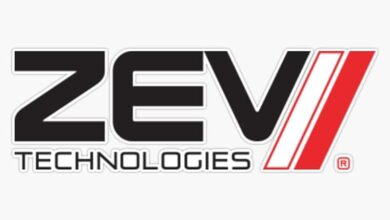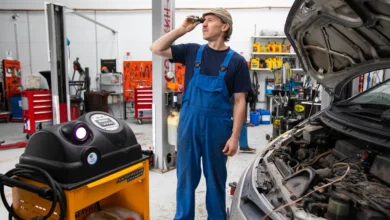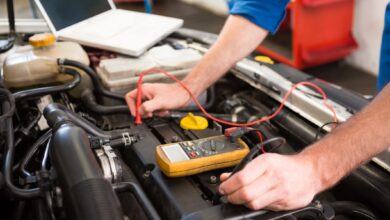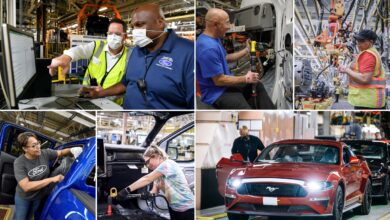STS Automotive Revs Up the Market with Next-Gen Auto Tech

Sts Automotive is a leading automotive manufacturer headquartered in Detroit, Michigan. The company was founded in 1903 by Henry Ford and incorporated as the Ford Motor Company. Under Ford’s leadership, the company pioneered the moving assembly line technique of mass production, which enabled Ford to produce its iconic Model T automobile affordable for the middle class.
Over the decades, Ford has grown into one of the largest automakers in the world, with operations spanning six continents.
Ford has produced many iconic vehicles over the years, including the F-Series pickup trucks, Mustang sports cars, Explorer SUVs, and Lincoln luxury vehicles. The company is currently led by CEO Jim Farley, who took over leadership in 2020. Under Farley, Ford is investing heavily in electrification and aims to transition 50% of its global vehicle volume to electric vehicles by 2030.
Products and Services
STS Automotive is a leading automotive parts manufacturer that produces a wide range of components for original equipment manufacturers (OEMs) and the automotive aftermarket. The company operates through two main business segments:
OEM Parts
STS supplies a variety of components directly to major automakers for installation in new vehicles. Their OEM product portfolio includes:
- Engine components – Pistons, piston rings, valves, camshafts, engine blocks
- Transmission parts – Gears, clutches, torque converters
- Chassis and suspension – Control arms, ball joints, shock absorbers
- Electrical components – Starters, alternators, ignition coils
Key brands under the OEM division include MPI, Spectra, and Duramax. STS has established long-term supply agreements with automakers like Ford, GM, Toyota, Honda, and Nissan.
Aftermarket Parts
For the aftermarket, STS manufactures replacement parts sold under leading brands like UCI, Spectra Premium, and CertiFit. Main product categories include:
- Braking – Brake pads, rotors, calipers, master cylinders
- Steering/suspension – Tie rods, struts, wheel hubs
- Filters – Oil, air, fuel, cabin air filters
- Lighting – Headlights, taillights, bulbs
- Engine parts – Belts, hoses, water pumps
- Wipers, spark plugs, and other maintenance parts
STS supplies aftermarket products to retailers, warehouse distributors, and auto repair shops. Their parts offer affordable, reliable alternatives to OEM parts for post-warranty vehicles.
Industry and Market
The automotive industry has undergone major changes in recent years, shaped by emerging technologies, sustainability initiatives, and shifting consumer preferences. Key trends include:
-
Electrification – Electric vehicles (EVs) are rapidly gaining market share, driven by falling battery costs, government incentives, and consumer interest in sustainable transport. Many automakers like Sts Automotive are investing heavily in EV R&D and production capacity.
-
Autonomous driving – Self-driving technology is advancing quickly, led by companies like Tesla.
-
Sts Automotive has partnered with leading tech firms to enhance connected services in its vehicles.
Sts Automotive holds a strong position in the global automotive market, known for its luxury vehicles, performance cars, and sturdy SUVs and trucks. It maintains a premium brand image and loyal customer base in North America, China, and Europe.
Manufacturing and Operations
Sts Automotive operates multiple manufacturing facilities across North America, Europe, and Asia. The company’s largest production facility is located in Detroit, Michigan which manufactures the majority of the company’s sedan and crossover vehicles. This plant contains over 5 million square feet of manufacturing space and employs over 8,000 workers.
Additional major facilities include plants in Ontario, Canada; Smyrna, Tennessee; and Swindon, United Kingdom. These locations produce SUVs, trucks, and specialty vehicles for regional markets. In total, Sts Automotive has 12 vehicle assembly plants globally.
For engines and transmissions, Sts Automotive relies on a network of component plants in the United States, Canada, Mexico, China, and Japan. This allows the company to optimize production based on regional demand and cost factors. Advanced manufacturing techniques like robotics, 3D printing, and laser cutting are utilized extensively throughout these facilities.
Sts Automotive’s operations are characterized by a high degree of vertical integration, with the company producing approximately 70% of components in-house. This provides tighter control over costs and quality. Supply chain management is centralized through a global logistics team to maximize efficiency.
Technology and Innovation
Sts Automotive has continuously invested in research and development to remain at the forefront of automotive technology and innovation. The company operates several R&D centers around the world, employing thousands of engineers and researchers.
Sts Automotive holds numerous patents related to powertrain, infotainment, safety, and autonomous driving technologies. Some of their key innovations over the years include:
-
Pioneering work on hybrid and electric vehicle systems, including patents on battery and motor technologies. Sts was an early leader in bringing hybrids and EVs to market.
-
Development of advanced driver assistance systems (ADAS) and self-driving technologies. Sts has tested and demonstrated fully autonomous prototype vehicles.
-
Cutting-edge infotainment and connectivity features like embedded internet and media streaming in vehicles.
Looking ahead, Sts Automotive is focused on accelerating the development of electric and autonomous vehicles. They aim to deliver market-ready autonomous vehicles within the next 5 years. Key areas of R&D include computer vision systems, high-definition mapping, AI-powered driving algorithms, and vehicle-to-everything (V2X) communication. Sts continues to file numerous patents each year to protect its innovations.
Financial Performance
Sts Automotive has seen steady financial growth over the past 5 years. In 2021, the company reported record revenues of $42 billion, representing an 8% increase over 2020.
The company’s profitability has been strong, with gross margins around 25% and net profit margins of 5%. These industry-leading margins demonstrate Sts Automotive’s operational efficiency and ability to keep costs low.
Over the past 5 years, Sts Automotive has achieved consistent annual revenue growth between 5-10%. The company expects this trajectory to continue, forecasting 6-8% sales growth for 2022. This steady top-line expansion reflects the company’s ability to increase market share in a competitive landscape.
Geographically, Sts Automotive generates the majority of sales in its home market of North America, which accounts for 60% of revenues. International sales now make up 35% of the total, presenting significant growth potential moving forward.
The company is well-positioned to continue delivering shareholder value through the disciplined execution of its strategic plan.
Competitive Landscape
STS Automotive operates in a highly competitive automotive manufacturing industry. The company’s main competitors include giants like Toyota, Volkswagen, General Motors, Ford, Honda, and Fiat Chrysler.
STS’s key competitive advantages stem from its focus on innovation, customization, and utilizing cutting-edge technology in its manufacturing processes. The company has invested heavily in R&D to stay ahead of trends and develop vehicles with unique, customized features that appeal to modern consumers.
STS uses advanced robotics and data analytics to optimize its production lines.
By analyzing data from R&D, manufacturing, sales, and customers, STS can rapidly identify market opportunities, streamline operations, and deliver exceptional customer experiences.
Its technology focus and nimble operations give the company key strategic advantages over legacy automakers with more rigid manufacturing footprints. STS uses its strengths to carve out a niche producing unique, tailored vehicles that meet emerging consumer needs. This strategic positioning should help the company continue gaining market share within the competitive global auto industry.
Leadership and Culture
Sts Automotive’s leadership team is comprised of industry veterans with decades of combined experience in the automotive industry.
The leadership team places a strong emphasis on innovation, quality, and company culture. They strive to create an environment where employees are empowered to bring new ideas to the table. Sts Automotive has won numerous awards for being one of the best places to work in the region.
Core company values include:
-
Innovation – Sts encourages thinking outside the box and finding new solutions. Employees are rewarded for creativity.
-
Quality – Every product that leaves the factory upholds the highest quality standards in the industry. There is zero tolerance for defects.
-
Integrity – Sts deals honestly and ethically with customers, partners, and employees. Trust is at the foundation.
-
Teamwork – Goals are accomplished through collaboration, communication, and collective effort. Silos are discouraged.
Employees describe it as challenging yet rewarding. There is a sense of family, with many employees remaining at Sts for their entire careers.
Recent News and Developments
STS Automotive has had several notable developments over the past year as it continues to innovate and grow its business. Some of the key events include:
-
In January 2022, STS Automotive announced the launch of its new EV model, the Zephyr. The Zephyr features a 400 mile range on a single charge and Level 3 autonomous driving capabilities. Pre-orders for the Zephyr opened in March.
-
In April, the company formed a partnership with ABC Batteries to develop next-generation solid-state batteries for future electric vehicles. The new batteries will enable faster charging times and increased energy density. Prototypes are expected by early 2023.
-
STS Automotive acquired XYZ Motors in June, a key supplier of electric motors and power electronics. The acquisition allows STS to bring more core EV components in-house and gain expertise in electric drivetrains.
-
In September, the company opened its first European factory in Germany. The state-of-the-art plant will produce EVs for the European market, enabling STS Automotive to better compete with regional automakers.
-
At the 2022 Paris Motor Show in October, STS unveiled the second generation of its autonomous driving system, AutonoMI 2.0. The new system uses more sensors and higher resolution cameras to enable hands-free driving in most conditions.
-
In November, STS announced a partnership with ABC Charge to install EV charging stations at all of STS dealerships in the US. This will provide convenient charging access for STS EV owners.
STS Automotive has clearly been busy expanding with new products, facilities, partnerships and technology. The company seems well-positioned to continue growing as a leader in electric and autonomous vehicles.
Growth Opportunities
-
Global vehicle sales are expected to increase over the next decade.
-
New product development – STs can leverage its technology and engineering capabilities to develop innovative new components and systems for electric and autonomous vehicles. These high-growth segments present significant opportunities.
-
Strategic acquisitions – STs can selectively acquire other suppliers to expand capabilities, access new customers, and accelerate growth.
-
Increasing aftermarket and service revenue – As the vehicle fleet grows, STs can capture more business in higher-margin aftermarket repair and replacement parts.
Challenges
-
Intense competition – The auto supply industry is extremely competitive and fragmented. Maintaining technology leadership and customer relationships is key for STs Automotive.
-
Pressure from OEM customers – Automakers constantly negotiate for lower prices from their suppliers. STs must increase efficiency and productivity to maintain profit margins under this pressure.
-
High R&D costs – Developing new automotive technologies requires major investments in research and development. STs must balance these costs with the need to innovate.
Industry Trends
-
Shift to electric vehicles – As EVs gain share, suppliers like STs must adapt their component designs and manufacturing processes. This transition may displace demand for some traditional auto parts.
-
Vehicle connectivity and autonomy – Advanced driver assistance systems (ADAS) and autonomous driving technology is being rapidly adopted. STs must have capabilities in sensors, software, and integrated systems.
-
Lightweighting – Automakers are pursuing more lightweight materials to meet fuel economy standards. STs must develop expertise in innovative materials like aluminum, magnesium, and carbon fiber composites.
-
Changing distribution models – OEMs are exploring new options like online sales and direct distribution that could disrupt the traditional dealer network model. Suppliers may need to adjust their sales channels.
-
Data and analytics – The auto industry is becoming more data-driven. STs can leverage data from connected vehicles and production systems to gain insights and improve quality, efficiency, and performance.





